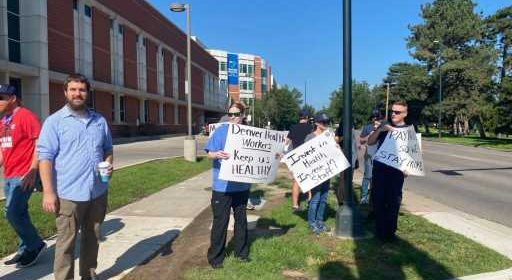Denver Health employees seek COVID-19 hazard pay

A group of Denver Health employees held a rally Tuesday to ask the hospital and government leaders to use a portion of the more than $300 million the county will receive for pandemic relief to give health care workers hazard pay for their time on the front lines.
The hospital is facing a shortage of employees, which is placing more work on the doctors, nurses, paramedics and others who remain behind, according to the employees who gathered outside of Denver Health.
“The hospital is critically understaffed at this point,” said paramedic Peter DellaVecchia, who was holding a sign that said, “Pay more so we stay more.”
He said that without better pay, it will become more difficult for Denver Health to retain employees — especially as they are struggling with burnout and trauma from their work during the pandemic and are considering leaving the industry.
The city and county of Denver will receive $308 million from the federal government that can go towards city services, eliminate furloughs for staff, COVID-19 vaccination campaigns and other efforts to bolster its economic recovery.
The first half of the money was given to the city and county in May, with the rest expected to be delivered next year, according to a news release announcing the funding.
Representatives with the governor’s office, Denver mayor’s office and Denver Health could not immediately be reached for comment.
About 20 workers and members of their union, the Denver Health Workers United, were at the protest at the corner of Speer Boulevard and Eighth Street in downtown. They waved signs at passing cars that said “Invest in Health Invest in Staff!” and “Turnover hurts patient care.”
Sara Jungels, a certified nursing assistant, said that CNAs were asked to sit with COVID-19 patients for 12 hours during the early days of the pandemic in the spring of 2020, increasing their exposure to the coronavirus.
She said she also had to drop out of nursing school because the staff was required to take on six extra shifts as part of their mandatory overtime during the spring surge.
Now, Jungels said, other CNAs have left the hospital after becoming sick with COVID-19 or because they were unable to take on mandatory overtime hours. This has meant there are days when Jungels is often caring for a floor of patients by herself, she said, resulting in fewer baths and other hygiene services for patients.
“We kept this place running,” she said. “We kept it open.”
Source: Read Full Article